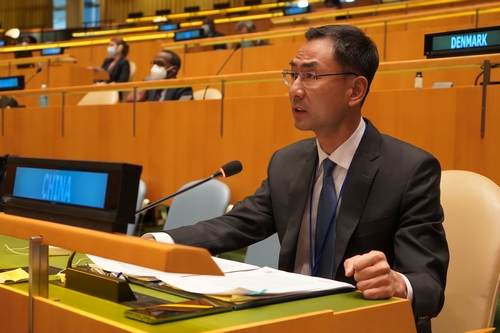| Ambassador Geng Shuang: Anything wrong with mentioning the concept of "a community of shared future for humankind" in the UN resolution? |
| 2020-11-06 07:45 |
|
On November 6, the draft resolution entitled “No first placement of weapons in outer space” was adopted at the Disarmament and International Security Committee (First Committee) of the 75th Session of the UN General Assembly. The fifth preambular paragraph of the resolution reaffirms that practical measures should be examined and taken in the search for agreements to prevent an arms race in outer space in a common effort towards a community of shared future for humankind. Prior to that, H.E. Mr. Geng Shuang, Deputy Permanent Representative of China to the UN, made a statement at the First Committee, explaining China’s position on a certain country’s request for vote on the separate paragraph containing the concept of “a community of shared future for humankind”. Geng Shuang said, the First Committee is about to take action on draft resolution L.62 entitled “No First Placement of Weapons in Outer Space”. It is shocking to know that separate votes on PP5, PP9 and PP11 are requested. PP5 refers to the concept of a community of shared future for humankind. Is there anything wrong with it? The COVID-19 pandemic shows us that all countries are interdependent and live in a community. No country can isolate itself and defeat the virus on its own. Climate change tells us that the international community has a shared future, and no group can escape or get exempted. Outer space security teaches us that humankind is faced with all kinds of threats and challenges, and no one can sit idly by. The concept of “a community of shared future for humankind” has received wide support from the international community, and its inclusion in the draft resolution on outer space is appropriate and pertinent. Those who question this concept, do they try to deny the fact that we live in a community interdependent on each other and having a shared future? Geng Shuang said, PP9 and PP11 refer to PPWT proposed by China and Russia and the political statements on no first placement of weapons in outer space. Is there anything wrong with it? Negotiation for a treaty on preventing an arms race in outer space is in the interests of all parties. Committing not to being the first to place weapons in outer space by some countries sets very good examples. These are important contributions made by UN Member States to safeguarding global strategic balance and stability and promoting international arms control and disarmament. It is inconceivable that some countries even try to challenge such acts of justice. They are just calling black white. We cannot help but wonder: are they telling us in a roundabout way that they wish to be the first to place weapons in outer space and trigger an arms race in outer space? Geng Shuang said, a certain country is obsessed with opposing whatever proposals made by China, and even claim that it will push back against all China’s initiatives. This will only create confrontation and division in the UN. Irresponsible and reckless requests for vote on separate paragraphs by certain country will only delay the UNGA First Committee meetings and obstruct the multilateral disarmament process. I call upon all UN Member States to vote in favor of the draft resolution entitled “No First Placement of Weapons in Outer Space” and its PP5, PP9 and PP11, to express a support for preventing an arms race in outer space and also a support for unity, fairness, justice and multilateralism. ************ “No first placement of weapons in outer space” is a traditional resolution of the UNGA First Committee and has been adopted by a vote every year since 2014. The concept of “a community of shared future for humankind” has been included in the resolution since 2017. The US requested a separate vote on the paragraph containing this concept last year, but ended up in failure. In the meeting of the 75th UNGA First Committee held on 6 November 2020, the US asked for a separate vote on the paragraph containing the concept of “a community of shared future for humankind”, but failed again. |
| |||||||||||||
| |||||||||||||
